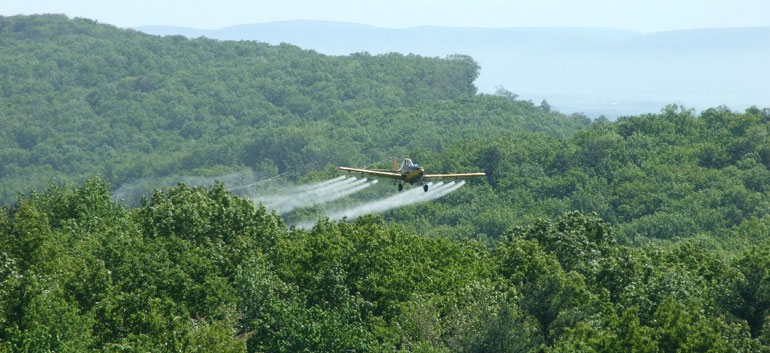The United States announced it had suspended fumigation operations targeting coca plantations in Colombia following the shooting down of two spray planes and the death of one American pilot, reported the Los Angeles Times Tuesday.
The two planes were reportedly shot down by gunfire from guerrilla fighters of Colombia’s largest armed rebel group the FARC.
While the downed planes were immediately reported to the media, “preliminary reports” from the Colombian police pointed toward “a mechanical failure.” According to the LA Times, it was not until this week that the FARC were officially accused in the incident.
MORE: American fumigation plane pilot killed in south Colombia crash
According to reporting by local newspaper La Vanguardia Liberal, the Colombian air force, while confirming that U.S. support for areal fumigation operations had been temporarily suspended, said the aerial anti-coca offensive would continue under jurisdiction of the local authorities.
The aerial fumigation operations are part of U.S.-Colombia bilateral pact aimed at combating coca cultivation, drug trafficking and leftist rebels. Washington has spent an estimated $8 billion on operations since the pact’s launch date in 2001.
According to LA Times, the aerial fumigation costs the U.S. about $50 million per year. The program has sprayed chemical Round Up pesticides over hundreds of thousands of coca cultivation every year during its operation. At the peak in 2006, more than 425,000 acres of coca cultivation were sprayed in the single year.
Peace talks between the government and the FARC continue in Havana, Cuba, where negotiators are currently working out a deal on how to jointly address Colombia’s problems with illicit coca cultivation and drug trafficking.
MORE: Colombia peace talks move to negotiating drug trafficking, coca cultivation
The FARC earlier this month issued a public proposal to decriminalize the cultivation of illicit crops and approach illicit drug use as a public health rather than a public security issue. Moreover, the FARC wants a “demilitarization” of Colombia’s counter-narcotics policy, and for local authorities to resist “imperialist” interventions when combating drug problems.
MORE: FARC proposes to legalize coca cultivation and decriminalize drug consumption
Coca production in Colombia has been falling in recent years, with a reported 25% drop in 2012, marking a historic low in the cultivation of the plant that constitutes the main ingredient in cocaine.
MORE: Colombia coca cultivation dropped 25%, hit record low in 2012: Report
Coca cultivation in Colombia
At a forum earlier this year, titled“Solutions to the Problem of Illicit Drugs,” representatives of coca cultivation areas from around the country, which included marginalized indigenous, campesino, and Afro-Colombian communities, forcefully condemned government policies, such as aerial fumigation, to combat drugs problems.
The representatives recommended increasing social and government investment in the economically depressed areas, offering poor farmers other opportunities to earn income and provide for their families other than cultivating coca for armed groups and drug traffickers.
MORE: Bogota forum on drugs: panelists call for increased rural investment
Sources
- Anti-coca spraying halted in Colombia after 2 U.S. pilots shot down (LA Times)
- Las fumigaciones a cultivos ilícitos están suspendidas (Vanguardia)


